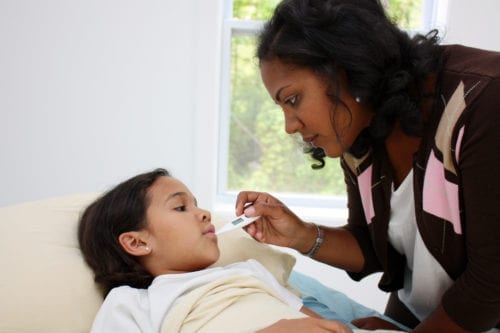By Kristie S. Rohman, MD
Fever is a common and frequently alarming symptom encountered in many childhood illnesses. It can be the cause of parental distress and confusion on when to treat, what to treat with, and when to become concerned. Many parents will become focused on normalizing their child’s body temperature in order to prevent any serious complications. This can result in overdosing of fever medications and, at times, make the child more uncomfortable. Should we be afraid of fever and the damage that elevated temperatures can cause? What are the do’s and don’ts of fever treatment?
Fever is the body’s natural response to a variety of conditions, most commonly infection. It is a symptom, not a primary illness, and has not been found to be a danger to a generally healthy child. Fever can have beneficial effects in slowing the growth of bacteria and viruses. There is no research to support the belief that fever puts children at risk for adverse outcomes such as brain damage. Use of fever reducing medication has also not been found to prevent the occurrence of seizures.
Fever, however, can certainly decrease activity level, interrupt sleep, and reduce oral intake when present in children. Most pediatricians would recommend fever reducing medication to improve these effects. The ultimate goal to remember in fever treatment is to make the child more comfortable, not to maintain a “normal” temperature. Fever reducing medication can relieve child distress, decrease the risk of dehydration, and can also provide pain relief. Increasing and encouraging oral fluids and decreasing activity level may also improve a child’s temperature. Most pediatricians advise against waking a sleeping child in order to administer fever reducing medication. Lukewarm sponge baths, which could potentially help lower body temperature, frequently lead to increased discomfort of the child. Alcohol baths are also not recommended due to the potential for side effects related to absorption of alcohol.
Acetaminophen (Tylenol) and Ibuprofen (Advil, Motrin) are considered safe and effective fever reducing medications with relatively no side effects if dosed appropriately. Acetaminophen may be given every 4 to 6 hours orally and will typically take effect within 30 to 60 minutes. Ibuprofen appears to provide longer symptom relief and has the added benefit of its anti-inflammatory effect. It may be given orally every 6 hours and takes effect in less than 60 minutes. Infants under the age of 6 months should not be given ibuprofen. The choice of which medication to use may be influenced by certain underlying medical conditions or other routine daily medications. In these cases, you should discuss taking any over the counter medications with your pediatrician or specialist first. While administering fever reducer medications, it is important to not use cough and cold medications that also include acetaminophen and ibuprofen. This can lead to inadvertent overdose. Aspirin should not be used for fever treatment in children.
There is some evidence to support the use of alternating therapy to reduce fever for a longer period of time although this is not recommended routinely due to concern for unsafe medication dosing. Alternating doses may be considered if the child’s discomfort recurs before the next dose of medication is due. Parents should consult their pediatricians to ensure that the proper formulations, dosing and dosing intervals are used to improve the child’s overall comfort. To decrease dosing errors, use the dosing device that is provided with the medication. Read and follow the dosing directions carefully each time. If you are unsure of the dose, call your pediatrician’s office for the correct weight based (not age based) dose.
Pediatricians encourage the use of fever reducing medications in their patients with fever in order to improve activity level, oral intake and sleep quality, and to decrease irritability. We recommend they only be given as needed and are stopped once symptoms resolve to minimize risks of adverse effects. Prolonged use of these medications is typically not needed because many fever illnesses are short lived viral infections. It is of utmost importance for parents to continue to monitor for signs and symptoms of serious illness and to encourage and maintain adequate fluid hydration while treating fever. We always encourage parents to call us with any questions about fever management.

